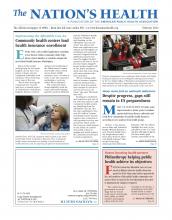The flu vaccine may not work as well in men with high testosterone, a recent study finds.
Published online Dec. 23 in Proceedings of the National Academy of Sciences, the study measured the boost in protective antibodies following vaccination against influenza. Researchers found men with relatively high amounts of testosterone seemed to have a weaker immune response following vaccination than women and men with lower testosterone levels.
“This is the first study to show an explicit correlation between testosterone levels, gene expression and immune responsiveness in humans,” said Mark Davis, PhD, the study’s senior author, a professor of microbiology and immunology and director of Stanford University’s Institute for Immunity, Transplantation and Infection. “It could be food for thought to all the testosterone-supplement takers out there.”
It has long been known that men’s immune systems do not respond as well as women’s to vaccines against flu, measles, hepatitis and other diseases. The new study sheds light on one reason that may occur.
When researchers looked at testosterone levels in their male research subjects, they found those with higher levels of testosterone had gene clusters linked to lower levels of antibodies after vaccination. Higher testosterone levels appeared to result in more gene expression. Those types of genes, when activated, tend to speed up the process of cells in suppressing immune response.
The findings match those in many previous animal studies that have concluded testosterone tends to suppress the body’s immune response.
The study found no link between so-called pro-inflammatory proteins and responsiveness to flu vaccine. The study also did not conclude that testosterone directly hampers immune response. Instead, testosterone seems to interact with a set of genes in a way that weakens the immune response, Davis said.
The study was based on an analysis of samples from 53 women and 34 men who have been getting blood drawn before and after yearly flu vaccination since 2008. That analysis found that, on average, women had significantly stronger antibody responses to the flu vaccine. The body produces antibodies to fight disease.
The analysis also found that in men, increased activity of a set of genes that tend to turn on and off at the same time was linked to a weakened immune response to the flu vaccine.
What continues to vex researchers is why evolution would design a hormone that enhances male characteristics, such as muscle strength and risk-taking, but weakens the immune system.
One theory, Davis said is that having a suppressed immune system can actually protect men from some health threats. For example, an over-reaction to strains of flu, dengue fever and other diseases can be deadlier than the virus itself.
In the past, researchers have found that women tend to have lower rates of bacterial, viral, parasitic and fungal infections than men. Generally, women have “more robust immune responses,” the study’s authors noted. Yet that more robust response can lead to problems such as a higher risk for autoimmune diseases such as rheumatoid arthritis and lupus. Women are also twice as likely as men to die from sepsis.
The study, funded by the National Institutes of Health and Stanford’s Department of Microbiology and Immunology, is online at http://www.pnas.org/content/111/2/869.full?sid=8599d663-04f4-425d-a208-43cccab15893.
- Copyright The Nation’s Health, American Public Health Association









